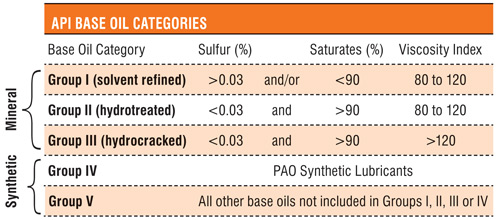This is a response to concerned about customers discovering there are no laws to protect the word synthetic.
September 2014
From the Presidents Desk
An email sent recently to AMSOIL corporate by Florida Direct Jobber George Douglas is worthy of discussion. The issue he raises carries ramifications across the motor oil industry, and many AMSOIL Dealers may have already been touched by it. George had this to say:
I read an article in last month’s Lubes ‘N’ Greases (magazine) concerning the cheap synthetics on the market that may have very little Group lll oil in them since there is no regulation or oversight from the API on what is in the bottle. I know that as a policy AMSOIL does not want to get into base oil wars, but I feel it may be time for AMSOIL to exploit this somehow through more education and/or in promo material. I was looking at oil prices in a store the other day and noticed one brand of full synthetic going for $3.43 a quart and the major brands of conventional oil going for nearly $5.00 a quart. This should raise a flag with consumers; how could synthetic oil be cheaper than petroleum oil? Also, I saw some of the really cheap synthetic in one of my installer’s stock rooms when I delivered oil to him last month. His AMSOIL purchases have reduced recently, and now I know why. You are all probably aware of this, but I thought I would give you my two cents.
First, thanks for your two cents, George. The point you raise is certainly legitimate, and I appreciate your interest in making all Dealers aware.
At one time, synthetic oil was made exclusively from polyalphaolefin and ester base oils. Then the landscape became a bit murky in 1999 when Mobil challenged Castrol when Castrol introduced an oil made from Group lll base oil and called it synthetic. The dispute played out before the National Advertising Division of the Better Business Bureau and Castrol prevailed. No big problem there. Group lll base oils offer good performance, and now GTL (gas-to-liquid) base oils have joined the Group lll segment.
The problem, as George indicates, is that there is no official regulation. Amsoil with less than 50 percent synthetic base oil can be labeled synthetic. In fact, there is absolutely nothing to prevent motor oil marketers from labeling oils made from conventional Group l or Group ll base oils as synthetic. There is currently no testing to verify the base oil content. And even if it was proven that the product contained no synthetic oil, there are no legal ramifications since no official definitions exist for the category.
The bottom line, of course, is that in many cases consumers are paying too much for oil that doesn’t measure up to the high standards of a true synthetic as AMSOIL defines the term. And on the flip side, consumers purchasing synthetic oil for $3.43 a quart are, in all likelihood, not getting what they think.
Tom Glenn, the author of the article that George refers to, offers this as a call to action:
Now is the time to take a closer look at the term synthetic and officially define what constitutes synthetic motor oil, based on measurable and meaningful attributes and clear-cut rules. In doing so, we can protect consumers from cheaters and level the playing field for those that play by the rules. If we don’t do it now, it may be too late to do it when synthetics dominate the passenger car motor oil segment.
I certainly hope that gets done. In the meantime, AMSOIL Dealers can set consumers straight.
Not all synthetics are created equal, and it may be that not all synthetics are actually synthetic at all.
AMSOIL created the synthetic motor oil market, and we continue to set the standard for performance. Our definition of synthetic doesn’t waver. Consumers can be assured that what they see on the label is what they’ll see in the bottle. With AMSOIL, people get what they pay for.
Editors comments:
Thank you George Douglas and Mr. Amatuzio! On my sales counter are articles I hand to customers regarding this base stock scam (or lie) which take advantage of customers. Most don’t believe it till they read about the lawsuit back in 1999. (Especially Corvette owners – they really trust the Chevrolet Service team. They come into my store to get oil for their other equipment). If Castrol doesn’t have to use true synthetic to be able to use the word, why should Mobil? To quote “Lubes ‘n’ Greases”, From that day the word “Synthetic” became a marketing term. For AMSOIL this locked in the advantage of selling something which really made a difference. AMSOIL has no stock holders to diminish the product. I tell my customers – “The difference is in the performance – you as a CUSTOMER don’t have to take my word.. Just try the oil and come to your own conclusion.” Even the XL blows minds over the best oils you can buy on the shelf. (Note: Pennzoil Platinum actually tested better than most other top tier big corp lubricants per a recent SWRi test publication.)



